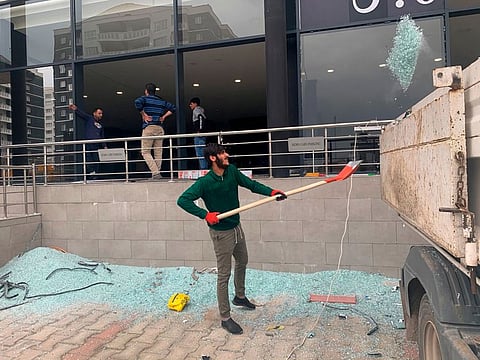Iraqis can no longer tolerate Iran’s proxies
Rampant attacks in the country by pro-Tehran militias undermine Iraq’s security

The Iraqi government has been helplessly fighting on two fronts in the past year — the rising number of COVID-19 cases and the increase in terror attacks on foreign missions and bases.
Prime Minister Mustafa Al Kadhimi has repeatedly pledged to crackdown on the rogue armed militias, mostly backed by Iran, which represent a strategic, and equally immediate, threat not only to the country but also the region’s security.
The sheer existence of these groups is also an obstacle to Iraq’s hope of reconstruction and attracting foreign investment and expertise to help the country rebuild its economy, infrastructure, and the health and education systems.
Iraq saw a disproportionately high number of coronavirus infections and deaths because of the inability of those sectors to cope with the outbreak. Despite this national crisis, foreign sponsor groups continue to wage a war of terror on their own people.
On Monday, a volley of rockets targeting an airbase in Iraq’s northern Kurdistan region killed a foreign civilian contractor and wounded five others and an American soldier, according to a statement by the United States-led coalition.
A previously unknown Iranian- allied group called ‘Awlayaa Al Dam’ battalions claimed responsibility for the attack in the northwestern outskirts of Erbil, the capital of Iraq’s autonomous Kurdistan, usually the country’s calmest and most peaceful region. The attack is a “dangerous escalation and a criminal terrorist act,” Iraqi President Barham Saleh said.
Iraq is plagued with more than a dozen such shadowy groups which have claimed responsibility for many of the terror attacks in the past two years, but it is no secret that these groups are just a front for the more known and armed pro-Iran factions such as Kataeb Hezbollah and Asaib Ahlul Haq.
These main groups, which have been part of the Hashd forces that battled Daesh along the government forces from 2015 to 2017, have since turned their guns on the international coalition forces, particularly the Americans in an attempt to drive them out, under orders from Iran, understandably.
Tehran seeks to consolidate its hegemony in Iraq and use it as platform to expand its influence in the region. It also aims to use its presence in Iraq as another bargaining chip in its expected talks with the US on the nuclear deal. Biden administration has said that talks would include, in addition to Iran’s ballistic missile programme, the latter’s malicious actions in the region.
However, its upon the Iraqi government to put those rogue militias in check. Al Kadhimi owes it to the Iraqi people to stand by his pledge to rid his country of the armed pro- Iran groups.



